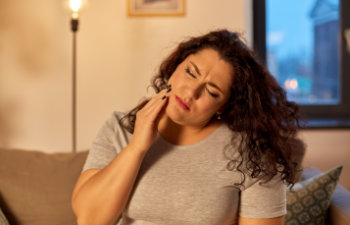
Sleep Bruxism, or teeth grinding, is a common condition where people clench and grind their teeth during sleep. Although the exact causes of bruxism are unknown, certain factors may trigger it, the following three being among the most common.
Stress and Anxiety
When people are stressed or anxious, their bodies release hormones such as cortisol, which can cause muscle tension in the jaw and face. This muscle tension can lead to teeth grinding during sleep. Additionally, stressed or anxious people may have trouble relaxing and unwinding before bed, which can also contribute to developing sleep bruxism.
Medications
Certain medications can trigger sleep bruxism. For example, some antidepressants and antipsychotics have been linked to teeth grinding during sleep. Additionally, drugs that contain stimulants, such as caffeine, can also contribute to the development of bruxism.
If you are taking any medications and experiencing sleep bruxism symptoms, talk to your healthcare provider to see if your medication could be contributing to the problem.
Sleep Apnea
Sleep apnea is a condition where people experience pauses in breathing during sleep. This can lead to various symptoms, including snoring, daytime sleepiness and teeth grinding. In fact, research has shown that people with sleep apnea are more likely to experience sleep bruxism than people without it. This may be because the pauses in breathing cause the body to go into a state of arousal, which can trigger teeth grinding.
Sleep Bruxism Remedies
Sleep Bruxism can lead to various problems, including tooth damage, headaches and jaw pain. Fortunately, there are several ways to treat bruxism; remedies include:
- Mouthguards: Sleep bruxism treatment often involves mouthguards. These nighttime mouthguards protect teeth from grinding. Over-the-counter and dentist-made mouthguards are available.
- De-stress: Relaxation, exercise and therapy can reduce bruxism symptoms.
- Medications: Changing medications or adjusting dosages may help.
- Dentistry: Dental correction may be needed if misaligned teeth or a bite issue causes bruxism. Braces, bridges and other dental procedures are possible.
- Lifestyle: Avoiding caffeine, alcohol and tobacco reduces teeth grinding. Good sleep hygiene and enough sleep can also improve sleep quality and minimize bruxism risk.
- Botox: Botox® injections can relax jaw muscles and stop teeth from grinding. Usually, this treatment is reserved for severe symptoms that have not responded to other treatments.
By addressing the triggers of sleep bruxism, you can improve your sleep quality and reduce the risk of long-term complications. Visit Atlanta Sleep Apnea Treatment Center to talk to Dr. Wayne G. Suway about your bruxism symptoms. He can determine the cause and develop a tailored treatment. Contact our office to schedule your first consultation today.
Posted on behalf of
1820 The Exchange SE, #600
Atlanta, GA 30339
Phone: (678) 401-7615
Mon - Thu: 8:30 AM – 5:30 PM
Closed for lunch: 12:30 PM - 1:30 PM
